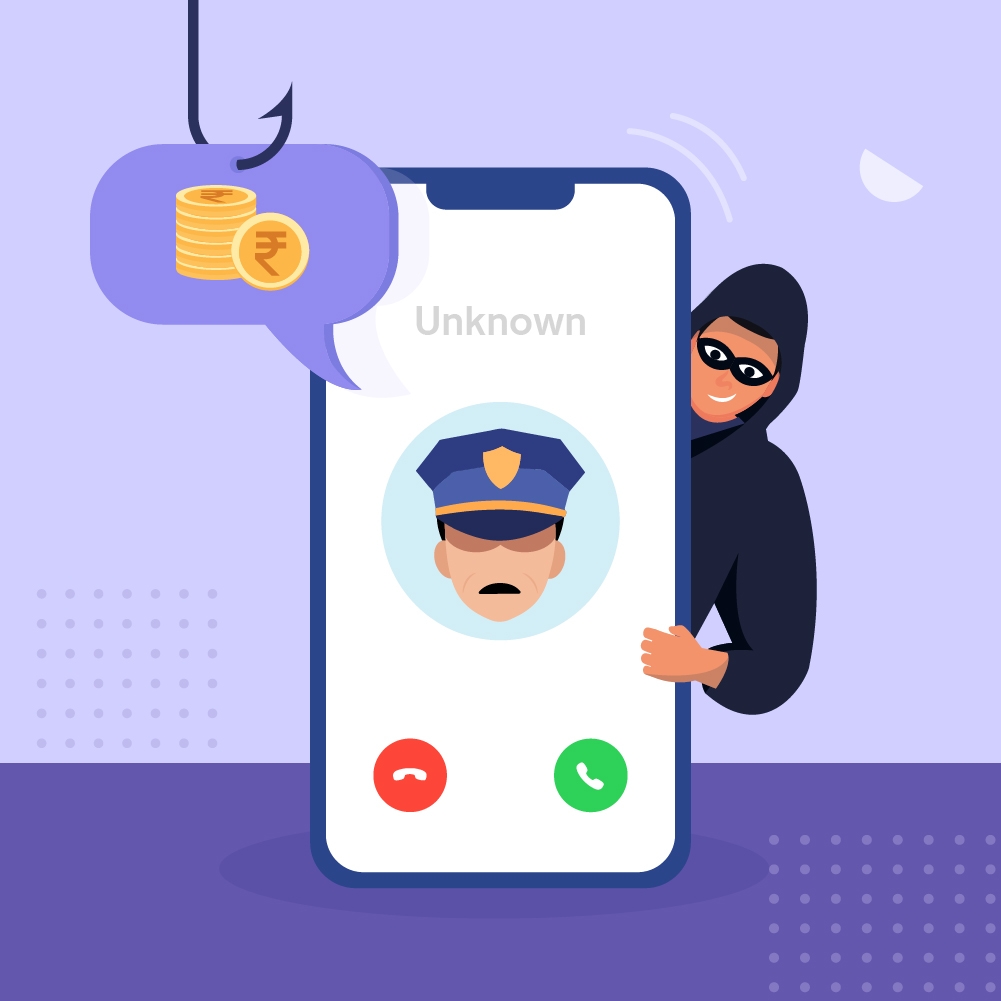
Trust & Safety
Police Calling? Stay Vigilant! Here’s How to Recognize a Digital Arrest Scam
Muktha Tavane|3 min read|04 December, 2024
Cybercrime relies on scammers instilling fear in their targets to defraud innocents. The latest technique to trick unsuspecting victims is to hinge on the existing sense of fear of law enforcement authorities such as the police or government authorities. The tactic, called “Digital Arrest” scam, plays on people’s fear of legal trouble and can convince people to fall prey to scamsters, when they are not aware of the warning signs.
In this blog, we will cover everything you need to know about this scam, how it works, and how to protect yourself from such instances.
What is a Digital Arrest Scam?
Digital Arrest scam is a type of impersonation fraud where scammers pretend to be law enforcement or legal authorities operating via email, text messages, or phone channels. They claim to have a warrant out for your arrest or that you are under investigation, typically for supposed online crimes or cyber offences. To resolve the issue, they’ll demand immediate payment or personal information, often threatening arrest if you don’t comply.
How does the Digital Arrest Scam work?
The goal of the Digital Arrest scam is to frighten you into making a payment or giving up sensitive information. Here’s the typical progression of the scam technique:
- Initial Contact: You first receive a call, email, or text message claiming to be from a government or law enforcement agency. The message may have fake government seals or logos and may even appear to come from a legitimate phone number.
- Text Messages (SMS): Text messages claiming that there are legal issues that require immediate attention.
- Phone Calls: Automated calls or live callers posing as police officers or legal representatives may contact victims.
- Social Media & Messaging Apps: Scammers can also use platforms like Facebook, WhatsApp, or other messaging services to reach out.
- Video Calls: Fraudsters impersonate law enforcement officials by conducting video calls in which they appear dressed in uniforms. They often use this tactic to intimidate victims, falsely claiming your involvement in criminal activities and demand immediate payment or sensitive information to avoid arrest.
- The Accusation: The scammer claims that you are under investigation for a serious offence, often something vague but alarming, like “suspicious internet activity” or “fraudulent transactions.” They may cite a supposed case number or use legal jargon to sound credible.
- Immediate Action: You are told that to avoid arrest, you must act quickly – either by paying a fine or providing personal information. They may ask for payment via cryptocurrency, gift cards, or wire transfer, as these methods are difficult to trace and reverse.
- Threats of Escalation: If you question the legitimacy of the call or hesitate to comply, the scammer often becomes aggressive, threatening further legal action, increased fines, or immediate arrest.
What to do if you’re targeted
If you suspect you’re being targeted by a Digital Arrest scam, follow these steps to protect yourself:
- Don’t respond immediately: Take a moment to think about the situation and calm down. Scammers rely on panic to trick their victims.
- Verify the contact: Contact the alleged agency directly through official channels (not the number provided by the scammer) to confirm whether the communication is legitimate.
- Report the incident: If you receive a suspicious message, report it to local authorities or consumer protection agencies. Reporting helps these agencies track scams and warn others.
- Protect your information: If you inadvertently shared personal information, take steps to protect yourself, such as changing passwords and alerting your bank if financial information was given.
- Use security software: Ensure your devices have up-to-date security software to protect against phishing attempts and malware that scammers might use to gain access to your information.
- Two-factor authentication (2FA): Enable 2FA on your accounts to add a layer of security if scammers try to access them.
- Educate yourself and others: Stay informed about common scam tactics and share this knowledge with friends and family to help protect them as well.
Scams like the Digital Arrest scam are designed to exploit fear and urgency. By being aware of the signs and staying calm under pressure, you can avoid becoming a victim and help prevent others from falling into the same trap.
How to raise an issue on PhonePe if you are a victim of Digital Arrest Scam
In case you have been duped by a fraudster via PhonePe, you can immediately raise the issue in the following ways:
- PhonePe app: Go to the Help section and raise an issue under “have an issue with the transaction” option.
- PhonePe Customer Care Number: You can call PhonePe customer care on 80–68727374 / 022–68727374 to raise an issue, post which the customer care agent will raise a ticket and help with your issue.
- Webform submission: You can also raise a ticket using PhonePe’s webform, https://support.phonepe.com/
- Social media: You can report fraudulent incidents via PhonePe’s social media handles
Twitter — https://twitter.com/PhonePeSupport
Facebook — https://www.facebook.com/OfficialPhonePe
- Grievance: To report a grievance on an existing complaint, you can login to https://grievance.phonepe.com/ and share the ticket ID previously raised.
- Cyber cell: Lastly, you can report fraud complaints at the nearest Cyber Crime cell or register a complaint online at https://www.cybercrime.gov.in/ or contact the Cyber Crime Cell helpline at 1930.
- DOT :If a digital crime has not occurred, but you are suspicious of it, report it even then. The Department of Telecommunications has launched a Chakshu facility on the Sanchar Saathi portal (sancharsaathi.gov.in), where one can report messages, calls, and WhatsApp accounts if they suspect them to be fraudulent.
